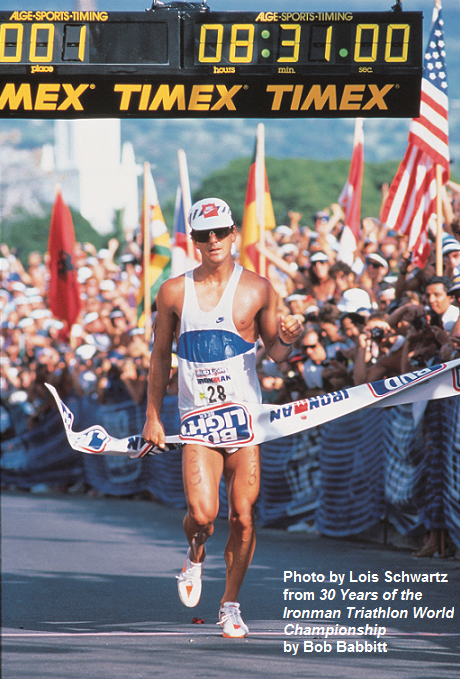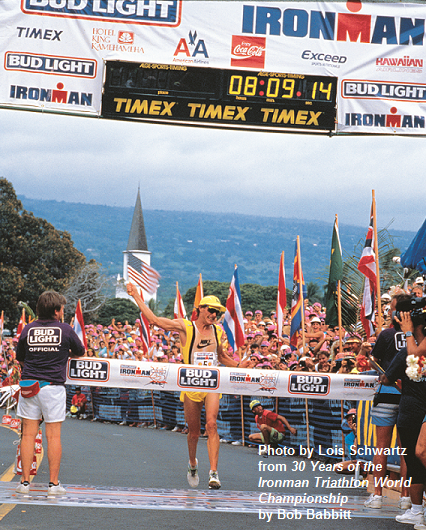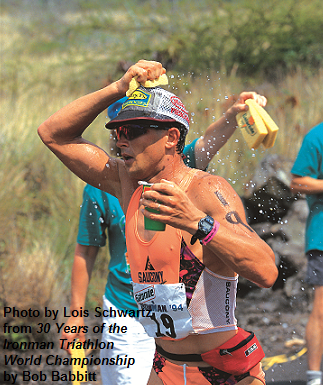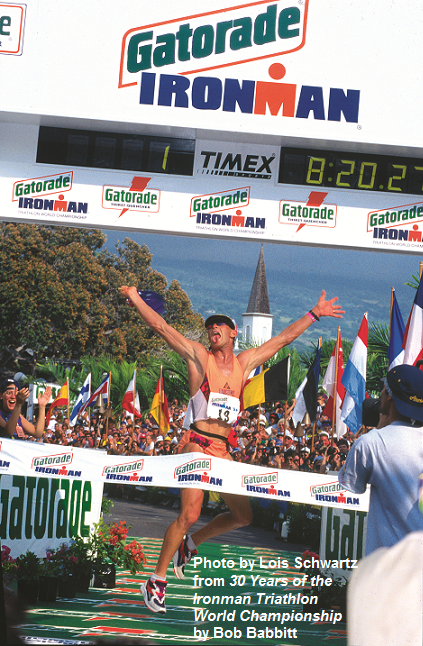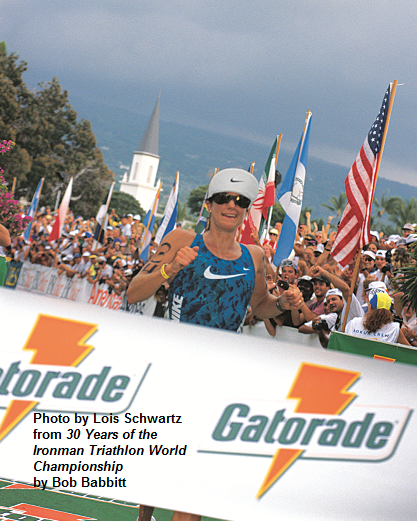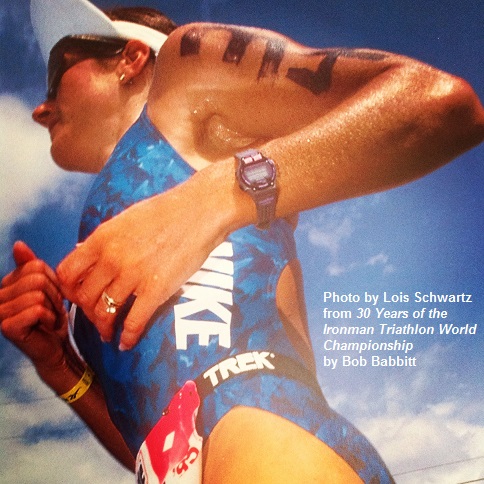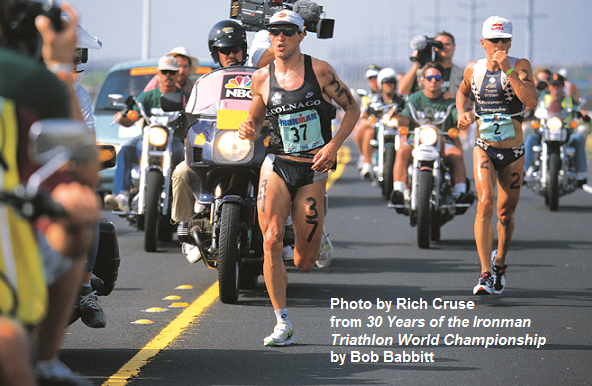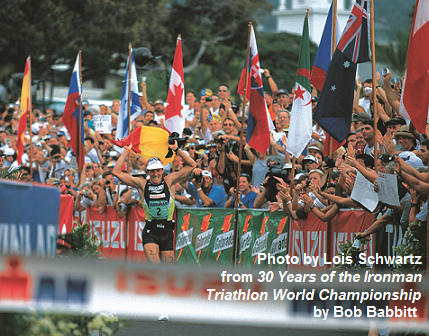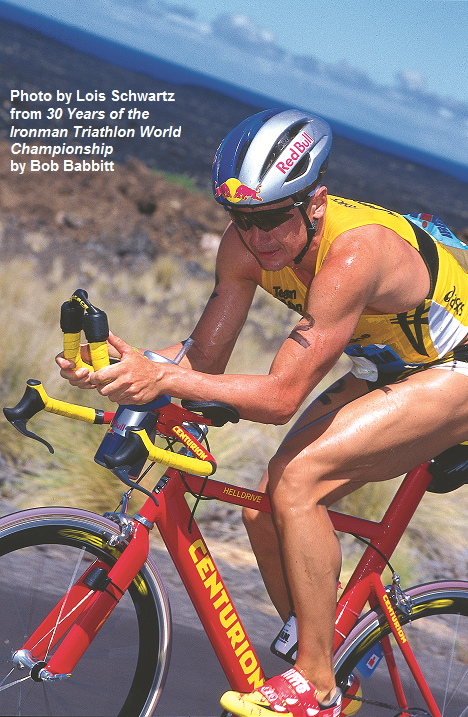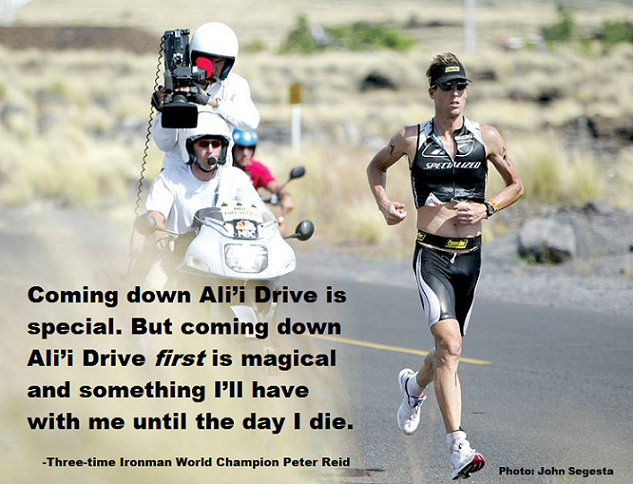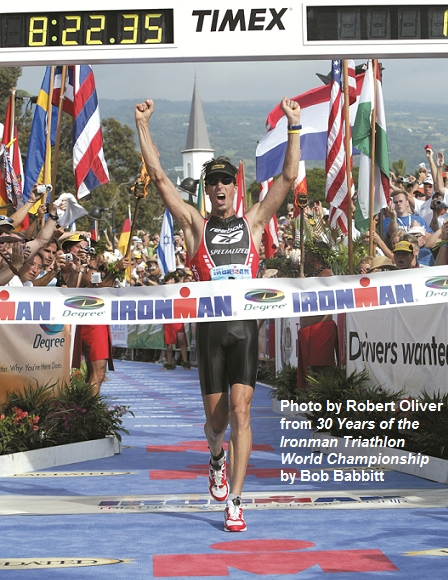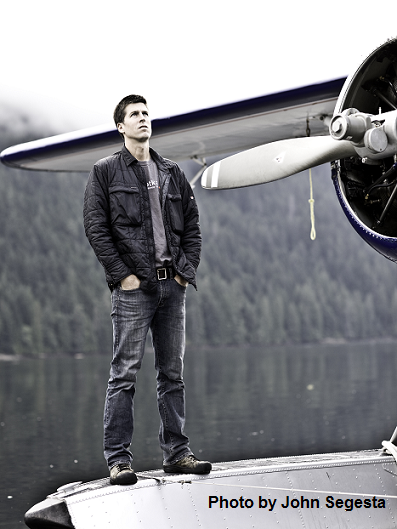September 4, 2015 – With the 2015 Ironman Triathlon World Championship a mere 36 days away, we thought it would be fun to countdown to race day with a look back at the 36 athletes who have won the most important race in endurance sports through radio conversations, Breakfast with Bob interviews, plus stories and photography from my 30 Years of the Ironman Triathlon World Championship coffee table book. Check back each day as we countdown to Kona!
[box style=”info”] Review the first 12 World Champions from our Countdown to Kona Part 1. [/box]
We kick off Part 2 with the undisputed Queen of Kona:
Paula Newby-Fraser

Paula Newby-Fraser wins her fourth title in a row in 1994
Paula Newby-Fraser is known as the Queen of Kona, and rightfully so. From 1985-1996 she won the Ironman Triathlon World Championship eight times, took second once, third twice, and fourth once. We call that domination!
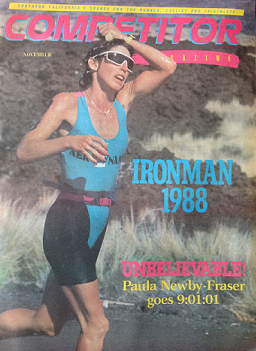
Paula Newby-Fraser on the cover of Competitor Magazine after going 9:01:01 in 1988, obliterating the previous fastest finishing time for a woman of 9:35:25, and finishing 11th overall. She would go on to become the first woman to break 9 hours, going 8:55:28 in 1992.
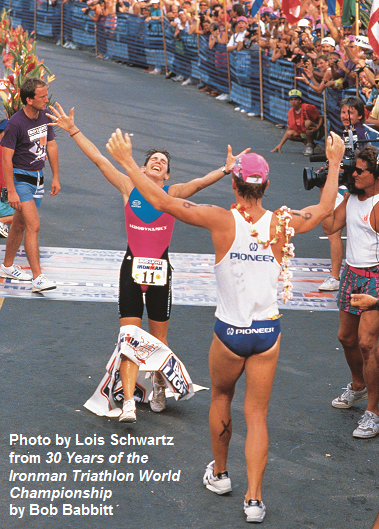
Paula Newby-Fraser set another course record in 1989, going 9:00:56, and was greeted at the finish by her future husband Paul Huddle

Erin Baker
New Zealand’s Erin Baker was the dominant female triathlete in the world in 1987. By winning the Ironman Triathlon World Championship she proved that she could win at any distance.
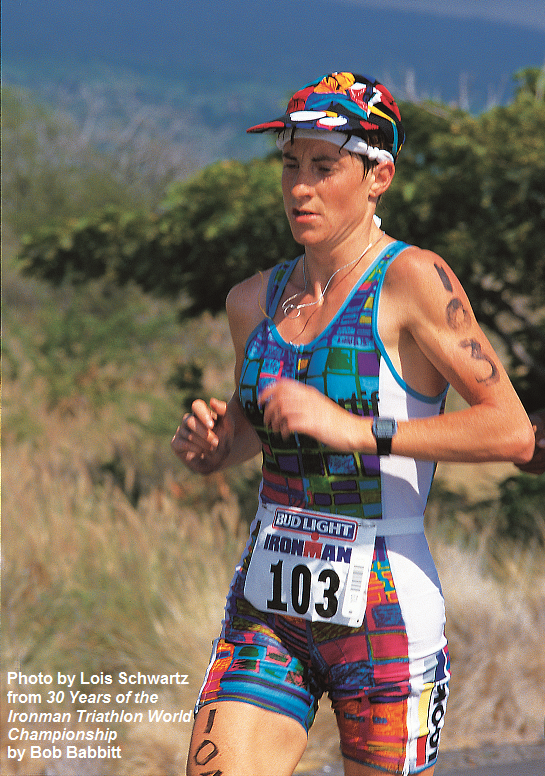
Erin Baker went 57:42 in the swim, 5:26:34 for the bike, and ran 3:11:08 for a winning time of 9:35:25 for her first Kona win in 1987.
After a second place finish in 1988 behind Paula Newby-Fraser, and battling back and forth in races throughout 1990, Erin and Paula set up an epic showdown in Kona coming into the 1990 race. (Erin did not race Kona in 1988, instead running the Chicago Marathon, where she ran 2:39:36.)
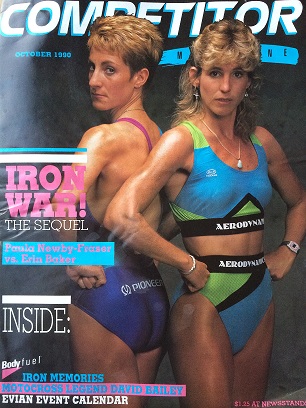
Erin Baker and Paula Newby-Fraser on the cover of Competitor Magazine for the pre-Kona October 1990 issue.
As the great Ken McAlpine put it in his cover article:
“Rarely does sport offer up such a scenario. Two divergent personalities, two athletes at the peak of their game, peeling back the veneer of potential with every race, set to meet on the grandest and most storied stage in their sport. Prepared, if conditions merit, to set standards that could vaporize limits on the endurance front. Saucy superlatives, yes, but this is great stuff.”
In 1990, the two raced each other several times: Paula got the win at the short distance San Diego International Triathlon. Erin then went on to win Ironman New Zealand in 9:38. (Paula did not race.) At Ironman Japan, the two battled horrific weather, side by side for most of the day until Paula took off on the second half of the run, winning in 9:11:25 with Erin in second place 10 minutes back. Their final pre-Kona showdown took place at Ironman Canada where Erin won with a blistering 2:49:53 marathon.
As the race unfolded in 1990, it was Erin’s day – outsplitting Paula in the swim (56:37 to 57:05), bike (5:12:52 to 5:14:45), and run (3:04:13 to 3:08:10) to take her second Ironman Triathlon World Championship in 9:13:42.
In 1991? Paula got the win, with Erin getting 2nd.
Scott Molina
Scott Molina was nicknamed ‘The Terminator’ and during his triathlon career he won 104 races including 50 USTS events, two World’s Toughest titles, plus a huge win at the 1988 Ironman Triathlon World Championship.
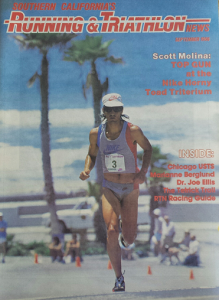
‘The Terminator’ on the cover on Running & Triathlon News, September 1986, after winning the first Nike Horny Toad Triterium
From the cover article:
“Sometimes there’s a guy in the race who’s good in the mud, in the rain, on the hills, on the flats, or even through knee-deep quicksand. If that’s the case, just put all the money you have on Scott Molina. As they say at the track…he’s money in the bank.”
Listen to a Babbittville Radio interview with Scott Molina.
Mark Allen
At the October 1982 Ironman, Iron Rookie Mark Allen, a lifeguard from San Diego, caught up to the 1980 Ironman champion on the way out to Hawi on the bike.
“Hey, Dave, what do you say we go for a run after this?” joked Allen.
Dave Scott was not amused. He clicked into a tougher gear and took off. Allen tried to do the same, but his derailleur broke and Allen was forced to drop out of the race.
It was the first of many meetings between Dave Scott and Mark Allen on the Big Island of Hawaii.
Mark Allen would eventually overcome all the demons, and beat his nemesis Dave Scott in the greatest Ironman in history, Iron War in 1989. Mark would go on to win the Ironman Triathlon World Championship five more times, including an unprecedented five in a row from 1989 to 1993, and then again in 1995, at his last Ironman.
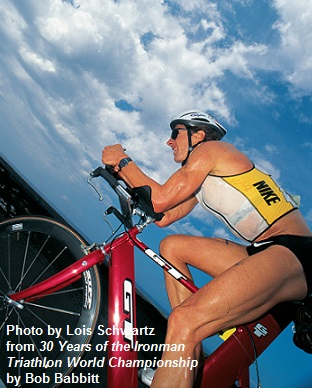
In 1995, Thomas Hellriegel went by Mark Allen like a jet and all Allen could do was hope the lead didn’t get too big.
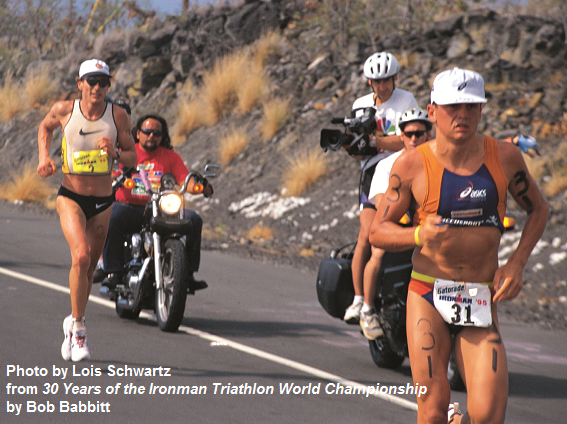
It was his last Ironman and he was 13 minutes down with 26.2 miles to go. Mark Allen had to pick up 30 seconds every single mile. When he did, it became one of the greatest comebacks in Ironman history.
Watch an interview with Mark Allen from August 2014:
It was one of those very special evenings in front of a packed house of Tri Club of San Diego members at FunctionSmart Physical Therapy in San Diego. The greatest male triathlete in history, six-time Ironman World Champion Mark Allen, joined us for a wide ranging Q&A that took us from the very beginning of his career, to his disappointments in Kona, his breakthrough at the classic Iron War race in 1989 with his nemesis Dave Scott and his final race-and victory- in 1995 where he overcame a seemingly insurmountable 13 minute deficit. Watch and listen to the greatest of them all share how he did it.
Listen to a Babbittville Radio interview with Mark Allen:
Greg Welch
Greg Welch became the first Australian to win the Ironman Triathlon World Championship (and the first non-American male) in 1994. The day came down to an epic battle with the 40-year-old six-time champion Dave Scott.
Welch’s commitment to Ironman had been six solid months of race-specific training. And, after 2.4 miles of swimming in a blender, 112 miles of cycling in a wind tunnel and 16 miles of running in a sauna, he discovered all that was only a precursor, an appetizer, a cocktail weenie, a lowly warm-up for the gut-check main course. Now, with 10 miles to go, in 95-degree heat, with the six-time winner of the Ironman practically flatting the backs of his racing shoes, Welch was being asked to ante up, to dig down to a place he had never been before.
“When Dave got to within 12 seconds, I knew that I really had to dig,” said Welch.
After taking the right turn out of the Natural Energy Lab, he finally allowed himself a quick glance back. He smiled and bounded to his toes. On his seventh try, just like Mark Allen, he knew his fantasy was coming true, and the biggest race in the triathlon galaxy was finally his.
“I’ve measured it,” Welch admitted. “After you come out of the Natural Energy Lab, it’s exactly 10.67 kilometers to the finish. I knew I could do that.”
-excerpt from 1994: Fantasy Island, from 30 Years of the Ironman Triathlon World Championship, by Bob Babbitt
Karen Smyers
Karen Smyers won the Ironman Triathlon World Championship in 1995. The race is memorable for the drama that unfolded during the run, with Karen putting pressure on the, at the time, seven-time winner Paula Newby-Fraser:
“Karen put on enough pressure to the point where I lost my focus and my center,” admitted Paula.
Coming out of T2, Karen started to slice and dice Newby-Fraser’s off-the-bike lead almost immediately. With a cloud cover overhead, Smyers quickly shook off the effects of the hard ride. In 1994, she had a similar deficit to overcome and came up far short. In 1995, Smyers looked leaner than ever.
“You don’t want to be carrying any extra baggage in the lava fields.” -Karen Smyers
Karen’s 3:05:20 marathon was the second fastest ever, at the time, behind Erin Baker’s 3:04:13 in 1990.
Luc Van Lierde
In 1996, it was his first time to the Big Dance, but you’d never know it. Even with three minutes in the box for drafting, Cool Hand Luc Van Lierde of Belgium still ran down Germany’s Thomas Hellriegel and became the first male Iron Rookie to win his debut since Dave Scott in 1980. He also set a new course record of 8:04:08, helped in large part by his 2:41:48 run.
Luc Van Lierde won his second Ironman Triathlon World Championship in 1999, beating the defending champion Peter Reid (2nd) and Tim DeBoom (3rd). Luc’s times: 50:38 for the swim, 4:41:26 for the bike, and 2:42:46 for the run, for a finishing time of 8:17:17.
Enjoy this Breakfast with Bob from Challenge Denmark interview with Luc Van Lierde, Thomas Hellriegel, and Chris McCormack:
Thomas Hellriegel
In 1995, it was Mark Allen. In 1996, it was Luc Van Lierde. After two tough second-place finishes, Germany’s Thomas “Hell on Wheels” Hellriegel finally won the big one in 1997.
In the interview, above, with Chris McCormack, Luc Van Lierde, and Thomas Hellriegel, Thomas talks about losing in 1995 and 1996, each by about two minutes and how his whole 1997 season was all about finding those two minutes. Lots of great reminiscing from the trio in the interview….
So how did Thomas Hellriegel know he was in trouble at the 1996 Ironman World Championship? He was on his way out of the Natural Energy Lab in the marathon when he spotted Luc Van Lierde in second place running down toward the turnaround.
“Usually when you have to pee and you are racing, you don’t stop. But I watched Luc stop, walk to the side of the road and pee. Then he took more time to bend over and tie his shoes. At that point I realized he wasn’t in a very big hurry and I was probably beaten.”
Heather Fuhr
In what writer Tim Carlson called a “passing of the torch,” Canada’s Heather Fuhr won the Ironman Triathlon World Championship in 1997, beating long-time friend and training partner Paula Newby-Fraser:
“Fuhr, with her gentle, self-effacing demeanor, survived her usual desultory swim, biked into position, and unleashed the giant within on the run. She came off the bike sixth, 8:10 behind Wendy Ingraham, 4:45 behind Newby-Fraser. In a dozen miles of the most brutal conditions in Ironman history, she blew by Fernanda Keller (mile two), Lori Bowden (mile seven), Sian Welch (mile nine) and now Newby-Fraser, who was fading.”
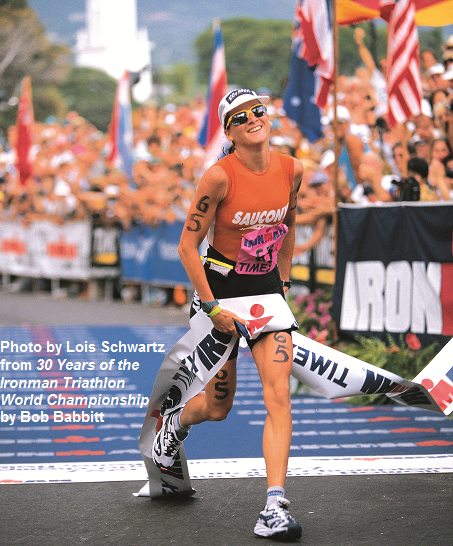
Heather Fuhr ran a blistering 3:06:45 on a brutal day, and finished in 9:31:43, ten minutes ahead of Lori Bowden in second place.
“When I passed her I said ‘Come on Paula. Let’s go for our long run now,” remembers Fuhr. Newby-Fraser told her that her day was done, that it was time for Fuhr to go at it alone. She did just that, winning the Ironman Triathlon World Championship title. The crown in her 15 Ironman wins in her career.
Heather Fuhr was inducted into the Triathlon Canada Hall of Fame in March, and will be inducted into the Ironman Hall of Fame in October.
Peter Reid
Canadian Peter Reid is one of only four men who have won the Ironman Triathlon World Championship three times. The others? Dave Scott, Mark Allen, and Craig Alexander. Reid won for the first time in 1998, and again in 2000 and 2003. On the feeling of being the first to run down Ali’i Drive, Reid describes it like this:
In this Babbittville Radio interview, Peter Reid shares the highs and lows of an amazing career. Listen here.
In 2002, Reid took time off after the race to savor his second-place finish. “Probably too much time. It took me awhile this spring and summer to get back in shape,” Reid said at the time. He finished 4th at Ironman Germany in Frankfurt that year.
Reid flew to Kona in mid-September and went up to 5,600 feet for two weeks of hard, solo training. No TV. No training partners. No wasted time.
“I did some amazing runs and rides up at altitude and didn’t train on the Ironman course.”
On race day 2003, he did everything right, and came across the finish line first for the third time in his life.
After retiring from racing, Peter Reid became a commercial pilot and flies float planes in British Columbia.
[box style=”media”] You can check out more amazing photographs from the talented John Segesta here. [/box]
Natascha Badmann
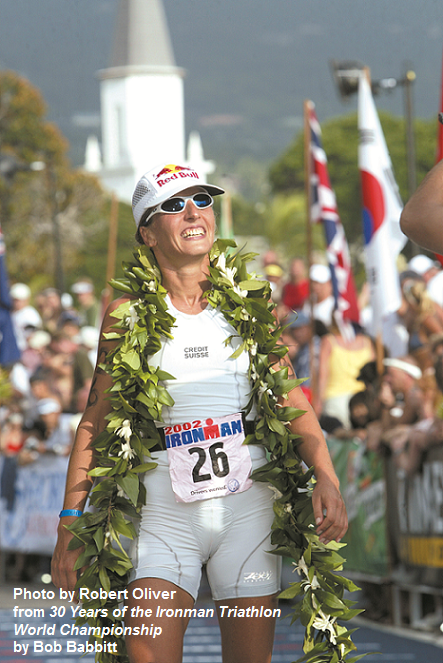
Natascha Badmann winning for the 4th time in 2002.
Natascha Badmann, of Switzerland, won the Ironman Triathlon World Championship an impressive six times – second to only Paula Newby-Fraser in the most wins ever by a woman, and tied with Dave Scott and Mark Allen. Natascha first won in 1998, then after sitting out 1999 to prep for the Olympics, came back in 2000 and proceeded to win three times in a row – 2000, 2001, and 2002. Natascha won again in 2004 and 2005.
In 2007, Natascha was badly injured in a bike crash during the race when she ran over an orange cone on the Queen K Highway, and had several rough years in Kona after that. But in 2012, at the age of 45, she had the fastest bike split of all the female pros – 5:06:07 – and finished in sixth place.
Now at the age of 48, Natascha continues to race as a pro, most recently finishing 3rd at Ironman Vichy, and reminds us once again that age is just a number.
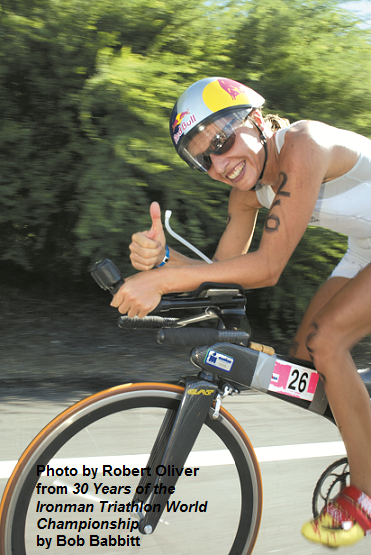
Natascha Badmann, with her ever-present smile, on the bike in 2002
Natascha’s formula for winning the Ironman? Give up as little ground as possible in the swim, destroy everyone on the bike, and smile and wave to the crowd during the marathon.
Lori Bowden

Lori Bowden on the run in 1997. Lori finished 2nd in 1997 behind fellow Hall of Famer Heather Fuhr.
Canadian Lori Bowden won the Ironman Triathlon World Championship in 1999 and again in 2003. She also has an impressive four second place finishes (1997, 1998, 2000, and 2001) and a third place finish in 2002, dominating the podium during that span of seven years.
Along with Heather Fuhr, Lori Bowden was inducted into the Triathlon Canada Hall of Fame in March, and will be inducted into the Ironman Hall of Fame in October.
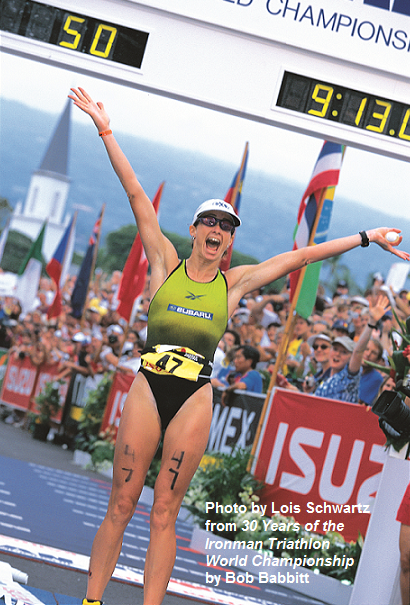
The Joy of Victory: Lori Bowden in 1999
In 1999, Bowden powered through tough conditions on the bike to put together a best-of-the-day 5:08:30, finishing the bike just three minutes behind leader Karen Smyers. When Smyers turned right at the Hot Corner (mile 7.4) and headed up steep Palani Road to the Queen K Highway, Bowden was just 10 seconds behind her. By the time Smyers reached the top of the hill, she was in second place.
“I saw Karen in the Natural Energy Lab, and she looked pretty good,” remembered Bowden. “No lead seems big enough. So when I got back to the highway, I hauled.”
She hauled fast enough to break Heather Fuhr’s run course record by nearly five minutes, going 2:59:16.
Bowden put together another impressive run when she won again in 2003, going 3:02:10.
[box style=”info”] The countdown continues with Part 3 here. [/box]




